BookBrowse first spoke to The Young Critics book club in 2008. Kate McClelland, who founded the club 25 years earlier, kindly answered all our questions, providing an inspiring framework for other libraries to follow. Tragically, Kate and her "Young Critics" colleague Kathy Krasniewicz were killed in a car accident a few months later, on their way to the airport after the American Library Association's Winter Convention.
In 2015 we checked back in with the club. This update can be found below the original interview.
2008
Hello Kate, thanks so much for taking the time to chat. First off, how did The Young Critics' Club get started?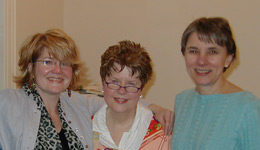
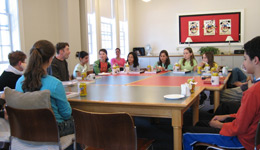
*A galley is a paperback copy of a book published some months ahead of publication for publicity purposes. They are sometimes also known as advanced readers copies or ARCs.
How important to the Young Critics is the fact that they're sometimes reading prepublication books? I ask this because obviously not every school, bookstore or library would be able to do this.
KM: I will say that the main reason kids give for wanting to join is the cachet of reading books before anyone else has the chance to even buy them. However, before I was feeding them all those galleys, they were just as happy with new books… books reserved especially for them. We add a note to our circulation computer system that the card holder is a club member and we do not charge fines for club books. All this makes them feel special, which they are.
How do you decide who reads which books, on the assumption that everyone can't read all of them?
KM: In the course of a year, every kid has a chance to read every book that interests him or her. Every year there are a few who manage to read everything. When we introduce a book, we try to put that book in the hands of a reader who we think will give it a boost up for other readers. Over the years, we get to know their reading preferences and their degree of enthusiasm.
What format do the reviews take?
KM: We keep reviews short and sweet because we don't want to make the process onerous or like homework in any way. The only time we require the club members to write is when they will miss a meeting and have a book to review. Nowadays they email. Their reviews are quick and dirty but passionate. To my delight, they do not always agree… with me or with each other. Interestingly, the readers who read the most and contribute the most enthusiastically to the discussion (I call them the "Leader Readers") receive the most books in trade from their own peers.
How do you decide which books to present to the group?
KM: For every book we introduce to the group, we read anywhere between 6 and 10 that don't make the grade. I promise club members that I will not bring anything that I do not love myself. That way I maintain my credibility. I will admit sometimes I use them as guinea pigs... as the publishers do obviously. But when I get a request from a publisher, I never agree unless I have read the manuscript and think the Critics will like it.
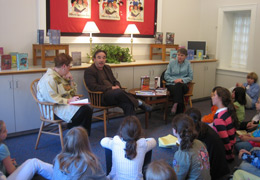
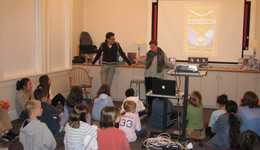
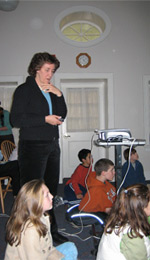
Do the members of the younger club automatically transfer to the middle-school club if they want to?
KM: When a Young Young Critic (5th grader) ages out of our younger group, he/she must reapply for the older group. Acceptance into the older club is based upon their selected titles, their ability to discuss and their previous attendance record in Y2C2. Most, but not all, get in because their background has given them the experience they need to enjoy the older group too.
Do you look for a certain type of reader or are you interested in a wide variety of readers?
KM: Because of the application process, reluctant readers don't usually join YCC. If they have somehow gotten through the application process, they soon drop out.
We are very up front about telling kids we expect them to try all genres. There are some things we avoid like "chick lit" unless it has a lot more to offer than the usual fare (e.g. A Great and Terrible Beauty). During the height of the Harry Potter craze we had lots of boys who applied with nothing but fantasy on their list of favorites, but they all agreed to read all types of books as a condition of membership.
We are totally about the love of books. We are cheerleaders for books, and we invite them to be cheerleaders too. We don't expect a "book report" or an essay. I think that is part of the attraction. Any guidance they get is from other young readers who will try to explain bits that have been confusing. They never make fun of someone who didn't "get" a more challenging book. They are very tolerant as a community of readers. The only thing they have no tolerance for is a person who does not bring his review book back so it can be passed along to other waiting readers.
The group demographics changes over time. A few times in our history we have had more boys than girls. I think the Harry Potter effect has faded, and we are back to being top heavy with girls. I usually tell boys who apply that they will be in the minority. Only once has that discouraged an applicant from joining.
I imagine that the Young Critics' Clubs must become extremely important, even inspiring, to many of these young people (and I bet that many reading this are wishing that something like this had been around for them when they were children!)
KM: It is inspiring, and it is the kids themselves in all their quirky, funny, loud, interruptive glory who inspire. The meetings are highly amusing and
entertaining... like herding the proverbial cats. I feel like I spend way too much time asking them to "hush" so I can hear people speak, but one day I overheard them talking about how they thought club meetings were a party; and I thought, "well, that's cool!"
I once heard a new member telling her mother in the parking lot how thrilled she was because she loved books and none of her friends read so she never had anyone to talk to about her books… they only wanted to talk about TV shows and movies. She said that in one room, for the first time, she met more people to talk to than she'd ever met before in her life!
Your oldest "Young Critic" must be approaching 40 years old at this point – I wonder, do you keep a track of where the children end up in their adult lives?
KM: We always tell the Young Critics that no one ever has to leave and many come back to visit. As you might guess, they are always overrepresented when awards are handed out senior year. We see them on breaks from college when they want to gather up all the YC books and read them ALL over the break. One visited a summer club meeting and gave a booktalk of Carl Hiaason's Flush. At least two have gone into publishing. One became a journalist. One is a librarian who has been very active in the Young Adult Literature community.
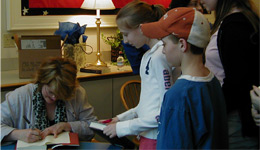
Self-selection is the key: Of the activity and of the books.
Thank you Kate; you, Mary, Kathy and indeed all the staff at Perrot Memorial Library, are truly an inspiration.
2015
In August 2015 BookBrowse checked in with Kathy Jarombek to find out what the club's been up to these past seven years:
We hear that the Young Critics book club has been going from strength to strength these past years. We'd love to know what you've been up to?
KJ: After the accident which killed Kate McClelland and Kathy Krasniewicz, Mary Clark (who had always run the 6th through 8th grade group with Kate) made sure that the groups continued. She and a colleague from the Greenwich Country Day School, Sarah Abercrombie, ran the older group and Jennifer Lau and I ran the younger group. Then I was hired full-time here and continued doing both groups with Mary Clark. Mary retired at the end of April this year and Jennifer Lau came back to help with the older group while Mary Jane Wynne is helping to run the younger group. We feel very proud to have been able to keep these groups going and continue Kate and Kathy's legacy here at Perrot.
It's great to hear that there was such a smooth transition especially in such difficult circumstances. Has there been much change in the way the clubs run?
KJ: Things haven't actually changed that much. Mary ensured that there was continuity in the short term; and all three of us now running the groups knew Kate and Kathy well and understand the philosophy behind the groups so structurally things haven't changed much at all. But we've all run children's groups previously, so bring experiences with us that I'm sure color things. And, of course, there's a whole new generation of children in the clubs now which brings its own subtle changes.
How many are in the groups now?
KJ: There are 31 in the 4th-5th grade group, and 38 in the 6th-8th grade group.
What upcoming books are the Young Critics excited about?
KJ: The continuing success of the group speaks to the Young Critics' dedication to reading and reviewing as many new books as possible in search of each year's best. This summer, the older group has been most excited about The Marvels by Brian Selznick, Nest by Kenneth Oppel and I Am Princess X by Cherie Priest. The younger group has been liking Fuzzy Mud by Louis Sachar and Diary of a Mad Brownie by Bruce Coville. Nick Gannon, the author of the upcoming The Doldrums, stopped by to visit this summer and both groups enjoyed reading his book and hearing him speak. We can't wait to see what the fall brings!
Thanks Kathy, it's been great to catch up!
More about The Young Critics' Club and the Young Young Critics' Club, including recent years' Best Books lists, can be found at perrotlibrary.org/young_critics.htm
See also:
The Dorothy Canfield Fisher Award Book Club and The Feisty Readers Book Club.
Further reading: The Prepub Book Club of Commerce Township, Michigan offers a different spin on a prepub book club.





The House on Biscayne Bay
by Chanel Cleeton
As death stalks a gothic mansion in Miami, the lives of two women intertwine as the past and present collide.

The Flower Sisters
by Michelle Collins Anderson
From the new Fannie Flagg of the Ozarks, a richly-woven story of family, forgiveness, and reinvention.

The Funeral Cryer by Wenyan Lu
Debut novelist Wenyan Lu brings us this witty yet profound story about one woman's midlife reawakening in contemporary rural China.
Your guide toexceptional books
BookBrowse seeks out and recommends the best in contemporary fiction and nonfiction—books that not only engage and entertain but also deepen our understanding of ourselves and the world around us.